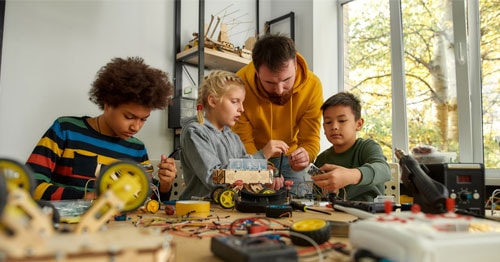8 Ways Online School Can Work for Your Family
byConnections Academy
6 min to read
Parents and caregivers of online school students have a unique opportunity to shape their child’s at-home learning experience. At Connections Academy®, we offer resources for all sorts of families, whether you’re a single caregiver household, a full-time Learning Coach—an adult responsible for assisting a student as they complete their online schoolwork—a working professional, a stay-at-home caregiver, or part of a learning pod. With the right tools and guidance, you can make online school possible for your family.
How Online School Can Work for Your Family
Figuring out how to make online school work for your family doesn’t have to be difficult. Here are eight ways real families of all types are using the role of Learning Coach to do just that—and how yours can, too.

1. Stay-At-Home Learning Coach
Stay‑at‑home caregivers are frequently the ones to guide students through virtual lessons while encouraging participation and independence. A great example comes from Therese C., whose children are thriving at home:
“This is year six and my boys have learned better than ever. And I just love having them home with me!”
Flexibility allows stay-at-home Learning Coaches to balance household tasks and individualized learning time so you can find time to encourage your student to do what they love, both inside and outside of the virtual classroom.
2. Multi-Student Learning Coach
Families with multiple online learning students typically find more success by establishing consistent daily routines for all kids. Synchronized breaks and themed group projects can also help simplify planning and keep the momentum going. Sometimes older siblings can chip in by mentoring younger ones, which helps preserve order and engagement across different grade levels. When students participate in collaborative learning, they figure out how to solve problems, construct explanations, and engage in academic discussions that lead to even greater student success.

3. Part-Time Working Learning Coach
With more than 53% of parents struggling to juggle work and family, flexible schedules are essential for many, if not most. Online school allows for this flexibility with adjustable daily schedules.
4. Full-Time Working Learning Coach
Even full-time working professionals can stay involved with their student’s learning journey. While an adult should still be accessible to your student during the school day, teachers at Connections Academy are available via email, calls, or scheduled conferences, so you won’t need to rush anywhere for a front‑row seat to your student’s education.

5. Co-Parenting Learning Coaches
With online school, shared custody or multiple households don’t have to complicate education. Connection Academy students can experience consistency across homes as tools like Learning Coach Central help guide different caregiver roles.
There are structures and video tutorials that help build trust and make joint decision‑making easier. You’ll find learning tools, outlines of Learning Coach responsibilities, and instructional support and reference materials as well.
Families also connect to the Learning Coach community for support networks with others facing similar situations.
6. Multiple Learning Coaches in One Household
Households with more than one coach can consider splitting responsibilities based on their individual strengths. One may handle math and the other literature, for instance. Part-time working caregivers and stay‑at‑home partners can alternate roles to share responsibility and reduce burnout.
Multiple Learning Coaches can also mean more time for each one to focus on balancing the variety of other-day-to-day adult responsibilities we all have while still supporting your student.

7. Single-Caregiver Learning Coach
Virtual learning provides an opportunity to help you balance your busy schedule and your child’s education. For instance, single-parent Learning Coaches who work might often encounter childcare issues for working parents. At Connections Academy, we offer plenty of clubs and extracurricular activities like Chess Club, Robotics Club, and a student newspaper that serve as a buffer to keep your student engaged and motivated while you work. Resources like tutors are also available, providing a critical support system when you’re unable to be there.
8. Learning Pod Coach
Learning pods—groups of students from different families who are guided throughout the learning day by the same Learning Coach—offer peer support and socialization while sharing instructional duties. Pods are especially great for families who need backup while they work or take care of other responsibilities.
How Can You Overcome Common Challenges of Online School?
No matter what type of Learning Coach your student may have, it’s likely that they will encounter common challenges in online school from time to time, no matter how experienced or prepared they are.
Here are a few ways to make online school work for your family to handle whatever comes your way:
Build a Daily Routine
Studies emphasize that consistent routines can reduce anxiety and support socio-emotional health. Use calendars visible in common areas to stay organized.
Designate Dedicated Learning Spaces
Create clear boundaries between each learner’s study space and the household’s work areas. This separation helps manage distractions for both students and working parents.
Manage Tech: Troubleshooting and Safety
Familiarize yourself with the online platform technology and have a plan for common issues like connectivity.
Review your school’s tech guide or FAQs before the year begins. Teach your student privacy and safety practices and consider adopting digital tools that allow shared oversight between caregivers and students.
Communicate and Engage
Regular two-way channels between parents and teachers are crucial. Use video calls, messaging apps, and parent portals to stay in sync and receive timely updates.
Encourage Peer Connections
Encourage your student to join virtual clubs, study groups, or live class discussions to maintain social connections and emotional well-being.
Fostering Independence in Your Child
One of the greatest long-term benefits of online school is how it nurtures self-reliance as your student learns to log in, manage deadlines, ask for help, and track their progress on their own.
For younger learners, that may start with completing a simple checklist while their Learning Coach assists their sibling with their schoolwork.
For older students, it may include setting daily goals, communicating directly with teachers, or organizing their workspace.
You can support your student's independence by:
- encouraging them to take ownership of part of their daily schedule
- letting them troubleshoot before stepping in
- celebrating small wins like completing a task without reminders
- modeling problem-solving when things don’t go as planned
Over time, students gain the confidence to navigate learning independently, whether they’re completing a science project, writing a paper, or preparing for high school and beyond.
How Online School Can Work for Your Family
No matter your family’s structure, flexibility, routine, clear communication, and a strong support network are key to making online school work for your family.
Try drawing inspiration from families who have found success in online school to tailor a plan that fits your family’s unique needs and watch your student flourish.
To learn more about personalized learning and your responsibilities, check out this quick guide to parent, student, and teacher roles in virtual school.
For more stories, schedules, parent resources, and guidance, explore Connections Academy’s resources and student stories pages and discover how to make online school work for your family.



